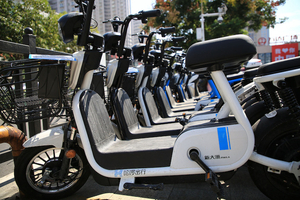Beijing to Pilot Shared Electric Bikes in Southeast Suburb
Listen to the full version

Beijing is to become the first major city to promote shared electric bicycles. It is launching a pilot program over a 65.7 square kilometer area in a southeast suburb starting on May 30.
The program aims to explore the feasibility of shared electric bikes as a safe and convenient travel option for citizens, said Beijing Economic-Technological Development Area.

Unlock exclusive discounts with a Caixin group subscription — ideal for teams and organizations.
Subscribe to both Caixin Global and The Wall Street Journal — for the price of one.
- DIGEST HUB
- Beijing is launching a pilot program for shared electric bicycles in a 65.7 sq. km southeast suburb starting May 30, 2023.
- The initiative follows a past ban on shared electric bikes in March 2022 and aims to introduce 6,000 electric bikes in phases, pending demand.
- Safety concerns exist due to past fire incidents, but shared electric bikes are considered safer than private ones, with strict regulations and centralized charging.
Beijing is set to become the first major city to endorse shared electric bicycles through a pilot program commencing on May 30, encompassing a 65.7 square kilometer area in a southeast suburb [para. 1]. The aim is to evaluate the viability of shared electric bikes as a practical and secure transport option for the public, as informed by the Beijing Economic-Technological Development Area [para. 2]. This initiative represents a significant policy shift as shared electric bikes were prohibited in March 2022; industry experts suggest that this could spur similar changes in policies in other first-tier cities [para. 3].
Currently, the Beijing Economic-Technological Development Area authorizes shared bicycle operations under controlled numbers. A recent directive announced that a portion of the existing shared bicycles would be replaced with electric bikes, proposing to introduce 6,000 electric bikes gradually based on demand [para. 4]. These electric bikes are required to comply with new national standards and specific regulatory measures from Beijing such as registration, smart helmets, real-name authentication, and precise vehicle positioning [para. 5]. Interested bicycle manufacturers and operators need to apply by May 24 to be a part of the program. Participating companies must conform to local traffic regulations, with centralized charging and restricted usage within the pilot area [para. 6].
China’s bike-sharing market has seen significant fluctuations since its boom in 2016. In 2017, there were over 77 bike-sharing companies in China with more than 23 million bicycles deployed across over 200 cities. Nevertheless, the high operational and maintenance costs have been challenging, leading to significant wastage from abandoned bikes [para. 7]. Shared electric bikes, preferred for their higher speed and charging convenience, have thrived in smaller cities with limited public transport infrastructure; they have become vital in areas like Foshan, Changsha, and Shantou [para. 8].
Despite government crackdowns, shared electric bikes have steadily been deployed in Beijing and Guangzhou. In August 2021, Beijing penalized eight bike-sharing companies and attempted to clear their bicycles off the streets. Similarly, Guangzhou has repeatedly imposed bans, but these companies continue operations on the fringes and suburban regions [para. 9]. The frequent fires associated with electric bicycles, typically caused by indoor charging or substandard batteries, are a growing safety concern. In February, a significant blaze in a ground-floor e-bike parking lot spread to a residential building in Nanjing, resulting in 15 deaths and 44 injuries [para. 10].
The fatal incident underscored the safety risks linked to e-bike batteries. In 2023, China witnessed 21,000 e-bike-related fires, reflecting a 17.4% year-on-year increase as per the National Fire and Rescue Administration [para. 11]. A month after the Nanjing fire, the local government promoted the development of shared electric bikes, considering them to be a safer alternative to private electric bikes known for fire hazards [para. 12].
Contact reporter Denise Jia (huijuanjia@caixin.com) for more information [para. 13].
- PODCAST
- MOST POPULAR






